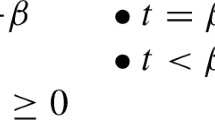Abstract
This paper investigates the concept of strong conditional independence for sets of probability measures. Couso, Moral and Walley [7] have studied different possible definitions for unconditional independence in imprecise probabilities. Two of them were considered as more relevant: epistemic independence and strong independence. In this paper, we show that strong independence can have several extensions to the case in which a conditioning to the value of additional variables is considered. We will introduce simple examples in order to make clear their differences. We also give a characterization of strong independence and study the verification of semigraphoid axioms.
Similar content being viewed by others
References
A. Cano, J.E. Cano and S. Moral, Convex sets of probabilities propagation by simulated annealing, in: Proceedings of the Fifth International Conference IPMU'94, Paris (1994) pp. 4-8.
A. Cano and S.Moral, A review of propagation algorithms for imprecise probabilities, in: Proceedings of the First International Symposium on Imprecise Probabilities and their Applications (ISIPTA'99), Ghent (1999) pp. 51-60.
A. Cano and S. Moral, Algorithms for imprecise probabilities, in: Handbook of Defeasible and Uncertainty Management Systems, Vol. 5, Algorithms for Uncertainty and Defeasible Reasoning, eds. J. Kohlas and S. Moral (Kluwer, Dordrecht, 2000) pp. 369-420.
J.E. Cano, S. Moral and J.F. Verdegay-López, Propagation of convex sets of probabilities in directed acyclic networks, in: Uncertainty in Intelligent Systems, eds. B. Bouchon-Meunier et al. (Elsevier, Amsterdam/New York, 1993) pp. 15-26.
E. Castillo, J.M. Gutiérrez and A.S. Hadi, Expert Systems and Probabilistic Network Models (Springer, New York, 1997).
G. Coletti and R. Scozzafava, Stochastic independence for upper and lower probabilities in a coherent setting, in: Proceedings of Information Processing and Management of Uncertainty in Knowledge-Based Systems Conference (IPMU-2000), Vol. I (2000) pp. 341-348.
I. Couso, S. Moral and P. Walley, A survey of concepts of independence for imprecise probabilities, Risk, Decision and Policy 5 (2000) 165-181.
F.G. Cozman, Robustness analysis of Bayesian networks with local convex sets of distributions, in: Proceedings of the 13th Conference on Uncertainty in Artificial Intelligence, eds. D. Geiger and P.P. Shenoy (Morgan Kaufmann, San Mateo, CA, 1997) pp. 108-115.
F.G. Cozman, Irrelevance and independence relations in quasi-Bayesian networks, in: Proceedings of the 14th Conference on Uncertainty in Artificial Intelligence, eds. G.F. Cooper and S. Moral (Morgan Kaufmann, San Mateo, CA, 1998) pp. 89-96.
F.G. Cozman, Irrelevance and independence axioms in quasi-Bayesian theory, in: Proceedings of the Fifth European Conference on Symbolic and Quantitative Approaches to Reasoning and Uncertainty (Ecsqaru'99), eds. A. Hunter and S. Parsons (Springer, Berlin, 1999) pp. 128-136.
F.G. Cozman, Credal networks, Artificial Intelligence 120 (2000) 199-233.
F.G. Cozman, Separation properties of sets of probability measures, in: Proceedings of the 16th Conference on Uncertainty in Artificial Intelligence, eds. C. Boutilier and M. Goldsmith (Morgan Kaufmann, San Mateo, CA, 2000) pp. 107-115.
F.G. Cozman and P. Walley, Graphoid properties of epistemic irrelevance and independence, in: Proceedings of the Second International Symposium on Imprecise Probabilities and Their Applications (ISIPTA'01), eds. G. de Cooman, T.L. Fine and T. Seidenfeld (2001) pp. 112-121.
A.P. Dawid, Conditional independence, in: Encyclopedia of Statistical Sciences, Update Vol. 2, eds. S. Kotz, C.B. Read and D.L. Banks (Wiley, New York, 1999) pp. 146-153.
L.M. de Campos and S. Moral, Independence concepts for convex sets of probabilities, in: Proceedings of the 11th Conference on Uncertainty in Artificial Intelligence, eds. Ph. Besnard and S. Hanks (Morgan Kaufmann, San Mateo, CA, 1995) pp. 108-115.
D. Dubois, S. Moral and H. Prade, Belief change rules in ordinal and numerical uncertainty theories, in: Handbook of Defeasible Reasoning and Uncertainty Management Systems, Vol. 3, Belief Change, eds. D. Dubois and H. Prade (Kluwer, Dordrecht, 1999) pp. 311-392.
E. Fagiuoli and M. Zaffalon, 2u: an exact interval propagation algorithm for polytrees with binary variables, Artificial Intelligence 106 (1998) 77-107.
K.W. Fertig and J.S. Breese, Interval influence diagrams, in: Uncertainty in Artificial Intelligence 5, eds. M. Henrion, R.D. Shacter, L.N. Kanal and J.F. Lemmer (North-Holland, Amsterdam, 1990) pp. 149-161.
K.W. Fertig and J.S. Breese, Probability intervals over influence diagrams, IEEE Transactions on Pattern Analysis and Machine Intelligence 15 (1993) 280-286.
R.C. Jeffrey, The Logic of Decision, 2nd edn. (Univ. of Chicago Press, Chicago, 1983).
S. Moral, Epistemic irrelevance on sets of desirable gambles, in: Proceedings of the Second International Symposium on Imprecise Probabilities and their Applications (ISIPTA'01), eds. G. de Cooman, T.L. Fine and T. Seidenfeld (2001) pp. 247-254.
S. Moral and N. Wilson, Revision rules for convex sets of probabilities, in: Mathematical Models for Handling Partial Knowledge in Artificial Intelligence, eds. G. Coletti, D. Dubois and R. Scozzafava (Plenum Press, 1995) pp. 113-128.
J. Pearl, Probabilistic Reasoning with Intelligent Systems (Morgan Kaufman, San Mateo, CA, 1988).
G. Shafer and P.P. Shenoy, Local computation in hypertrees, Working Paper No. 201, School of Business, University of Kansas, Lawrence (1988).
P.P. Shenoy and G. Shafer, Axioms for probability and belief-function propagation, in: Uncertainty in Artificial Intelligence 4, eds. Shachter et al. (Elsevier, Amsterdam, 1990) pp. 169-198.
M. Studeny, Semigraphoids and structures of probabilistic conditional independence, Annals of Mathematics and Artificial Intelligence 21 (1997) 71-98.
B. Tessem, Interval probability propagation, International Journal of Approximate Reasoning 7 (1992) 95-120.
P. Vicig, Epistemic independence for imprecise probabilities, International Journal of Approximate Reasoning 24 (2000) 235-250.
P. Walley, Statistical Reasoning with Imprecise Probabilities (Chapman and Hall, London, 1991).
P. Walley, Towards a unified theory of imprecise probability, International Journal of Approximate Reasoning 24 (2000) 125-148.
N. Wilson and S. Moral, A logical view of probability, in: Proceedings of the Eleventh European Conference on Artificial Intelligence (ECAI'94), ed. A. Cohn (Wiley, London, 1994) pp. 386-390.
Author information
Authors and Affiliations
Rights and permissions
About this article
Cite this article
Moral, S., Cano, A. Strong Conditional Independence for Credal Sets. Annals of Mathematics and Artificial Intelligence 35, 295–321 (2002). https://doi.org/10.1023/A:1014555822314
Issue Date:
DOI: https://doi.org/10.1023/A:1014555822314




